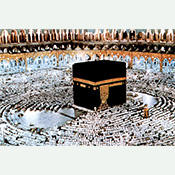 Hajj (pilgrimage to Mecca) is one of the Five Pillars of Islam. The Hajj occurs in the month of Dhu’l-Hijjah and symbolizes the unity of the Muslim ummah. During the time of the pilgrimage, Muslims around the world celebrate Eid al-Adha, or the Feast of Sacrifice.
Hajj (pilgrimage to Mecca) is one of the Five Pillars of Islam. The Hajj occurs in the month of Dhu’l-Hijjah and symbolizes the unity of the Muslim ummah. During the time of the pilgrimage, Muslims around the world celebrate Eid al-Adha, or the Feast of Sacrifice.
View Full Album
Hajj, the fifth pillar of Islam, refers to pilgrimage to Mecca along with the performance of a set of religious rites. The Hajj has become a powerful symbol of unity within the worldwide Muslim ummah. Annually, over two million Muslims converge in Mecca, Saudi Arabia to visit the Ka’bah, the “House of God” toward which all daily ritual prayers are directed.
Malcolm X described the pilgrimage in his autobiography:
“There were tens of thousands of pilgrims, from all over the world. They were of all colors, from blue-eyed blonds to black-skinned Africans. But we were all participating in the same ritual, displaying a spirit of unity and brotherhood that my experiences in America had led me to believe never could exist between the white and the non-white.”
Malcolm X’s experiences on the Hajj transformed his beliefs on race as well as his understanding of Islam; he changed his name to reflect this transformation, becoming El-Hajj Malik El-Shabazz. Many Muslims add the title “Hajji” to their name after the completion of the pilgrimage.
Hajj is a required duty for all Muslims to perform at least once in their life, given they have the financial and physical capabilities of doing so. The Hajj rites take place in Dhu’l-Hijjah, the twelfth month of the Muslim calendar. Before pilgrims arrive in the sacred precinct of Mecca, they purify themselves with ablutions and prayer. Then pilgrims don two seamless white garments called ihram, which symbolize both human equality and ritual purity. After this they enter into the sacred precinct of Mecca and perform the rites of Hajj which involves circumambulating the Ka’bah seven times; running between the hills of al-Safa and al-Marwa, located just outside al-Masjid al-Haram, commmorating the faith of Abraham’s wife Hagar and their son Ishmael; assembling at Mount Arafat on the ninth day for the afternoon prayer and the Arafah (“standing”) ceremony, which commemorates both Muhammad’s Farewell Sermon and the last revelation of the Qur’an; stoning the pillars representing Satan; and offering sacrifices of sheep, goats and camels at Mina on the final day as a commemoration of Abraham’s willingness to sacrifice his son, observed throughout the world as Eid al-Adha, “the Feast of Sacrifice.” The Hajj journey lasts a total of six days; however, many may decide to arrive earlier and/or leave later in order to visit the sacred sites in Mecca and nearby Medina, where the Prophet Muhammad’s mosque is located. A number of American travel agencies offer all-inclusive Hajj packages which include stay, dining, travel, a guide for the activities on each day of Hajj, along with visitations and tour guides to sacred sites.
Muslims around the world who are not on pilgrimage share celebrating Eid al-Adha, the Feast of the Sacrifice, with the pilgrims in Mecca. The night before Eid is commonly spent in prayer. Then all Muslims who have sufficient funds to do so sacrifice an animal, using some of the meat for their own family and distributing the rest to relatives and the poor. On Eid al-Adha, Muslim communities gather for prayer and hear a sermon, often on obedience and perfect trust in God, following the example of the Prophet Abraham, who was willing to sacrifice his son at God’s command. Eid al-Adha is a four-day celebration, involving the giving of presents and the celebration of special dinners with friends and relatives. In this way, all Muslims participate in the communal experience of the pilgrims in Mecca.
In Mecca, Muslims from all over the world gather for the pilgrimage; in Toledo, Ohio, American Muslims from over twenty different nationalities gather for Eid al-Adha. At the Islamic Center of Greater Toledo, as many as 1,000 people participate in salat al-eid, the special Eid prayer, which is performed in the morning. Prayer is followed by a brunch, sponsored by the center’s kitchen committee, featuring foods from around the world. The rest of the day is full of activities, with special programs for the children, gatherings of family and friends, and visits to the local cemetery.
Many Islamic relief foundations in the United States provide community and charitable services in association with Eid al-Adha. For example, some Muslim organizations, such as Islamic Relief, run special Eid al-Adha programs, which enable American Muslims to donate money to serve impoverished people around the world. Other programs, such as ICNA Relief, organize drop-off points for more affluent Muslims to donate qurbani (sacrificed) meat for other Muslim families in the community who might be in need.